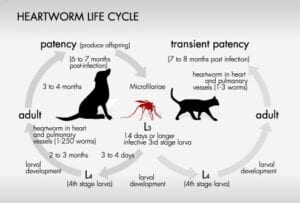What is Heartworm Disease and How do I prevent it?
July 6, 2021
Warmer weather is coming! With warmer temperatures comes mosquitos, and with mosquitos comes the rise in heartworm disease in our dogs and cats. In North Carolina, we are among the top ten states for infection, so knowledge of prevention is especially important as summer approaches. Read on to educate yourself on heartworm disease and how to prevent it in your pet!
Heartworm in DOGS:
- The only way to contract heartworm disease is from infected mosquitos. Unprotected dogs, foxes & coyotes are the reservoirs, and only about 45% of dogs are protected on heartworm prevention.
- Heartworms develop in the body and can be 10-12 inches long. They make their home in the right side of the heart and lung arteries. Heartworms can live for 5-7 years.
- Heartworm testing tests for a protein that an adult female heartworm produces. False negatives often occur due to a small number of female worms (0-5), or if they have not reached maturity.
- There are 5 life stages from mosquito bite to adult female. This maturation process takes 4-6 months.
- Heartworm disease will worsen without treatment due to reproduction and link of life. This disease can adversely affect heart, lungs, liver, and kidneys.
- Our region of North Carolina is a high area of infectivity. Two of every three unprotected dogs in our area will become heartworm positive.
- It may take years to see clinical signs of disease. Symptoms may include cough, shortness of breath, exercise intolerance, listlessness, swollen belly, and eventual death.
- Heartworm prevention is much safer and more affordable than treatment. This is especially important right now, since treatment medications are in short supply!
**The heartworm medication Ivermectin should not be given to herding dogs, due to a specific genetic drug sensitivity.
**Milbemycin (Interceptor, Sentinel, Trifexis, Revolution) should NOT be given to heartworm positive dogs!

Positive effects of Heartworm Prevention:
- Kills microfilariae (heartworm larvae)
- Prevents new infection
- Sterilizes female heartworms so they can no longer reproduce
Heartworm in CATS:
- The disease process is a little different- usually there are only 1-3 worms and they do not reproduce
- Like dogs, it is contracted by mosquito bite
- Testing must be done by an outpatient laboratory, with increased cost
- Prevention is especially important because treatment for cats in unavailable
- Also, female heartworms can grow to be 12 inches long. This can cause irreversible damage in a small cat
- Clinical signs can be coughing, rapid breathing, weight loss, vomiting, or sudden death.
- Oral and topical forms of prevention are available
- Many university studies have shown that up to 15% of all cats, both indoor and outdoor, have been exposed to feline heartworm disease.
For more information, talk to your veterinarian and visit www.heartwormsociety.com!
DISCLAIMER: ANY INFORMATION PROVIDED ON THIS SITE IS FOR EDUCATIONAL PURPOSES ONLY AND SHOULD NOT BE A SUBSTITUTE FOR PROFESSIONAL MEDICAL ADVICE, DIAGNOSIS, OR TREATMENT. GENERALIZED CASES AND SCENARIOS DO NOT APPLY TO EVERY PET. ALWAYS CHECK WITH YOUR OWN VETERINARIAN BEFORE USING ANY INFORMATION OR ADVICE PROVIDED HERE, OR TRYING ANY TREATMENTS ON YOUR OWN. ANY COMMENTS OR RESPONSES MADE ON THIS BLOG DO NOT CONSTITUTE A VALID CLIENT-PATIENT-DOCTOR RELATIONSHIP. RELYING ON INFORMATION PROVIDED BY THIS SITE IS SOLELY AT OUR OWN RISK.
Posted in Uncategorized
